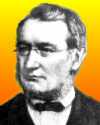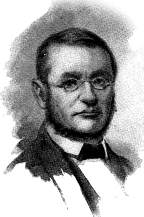 (source)
(source)
|
Robert Mayer
(25 Nov 1814 - 20 Mar 1878)
German physicist who had the idea of the conservation of energy before either Joule or Helmholtz and measured the mechanical equivalent of heat.
|
Science Quotes by Robert Mayer (6 quotes)
My position is perfectly definite. Gravitation, motion, heat, light, electricity and chemical action are one and the same object in various forms of manifestation.
— Robert Mayer
Annalen der Chemie und der Pharmacie (1842). Trans. A. S. Eve and C. H. Creasey, The Life and Work of John Tyndall (1945), 94.
Nature has put itself the problem how to catch in flight light streaming to the earth and to store the most elusive of all powers in rigid form. To achieve this aim, it has covered the crust of earth with organisms which in their life processes absorb the light of the sun and use this power to produce a continuously accumulating chemical difference. ... The plants take in one form of power, light; and produce another power, chemical difference.
— Robert Mayer
In pamphlet, The Organic Motion in its Relation to Metabolism (1845), as translated in Eugene Rabinowitch, Govindjee, Photosynthesis (1969), 9.
The blood corpuscles take up the atmospheric oxygen in the lungs, and the vital chemical process accordingly depends essentially on the combination of oxygen absorbed by blood corpuscles with the combustible constituents of the blood to form carbonic acid and water.
— Robert Mayer
Quoted in Joseph Stewart Fruton Proteins, Enzymes, Genes: The Interplay of Chemistry and Biology (1999), 240.
The fall of a given weight from a height of around 365 meters corresponds to the heating of an equal weight of water from 0° to 1°.
— Robert Mayer
'Bemerkungen über die Käfte der unbelebten Natur', Annalen der Chemie und Pharmacie (1842), 42:2, 29. Trans. Kenneth L. Caneva, Robert Mayer and the Conservation of Energy (1993), 25.
The physiological combustion theory takes as its starting point the fundamental principle that the amount of heat that arises from the combustion of a given substance is an invariable quantity–i.e., one independent of the circumstances accompanying the combustion–from which it is more specifically concluded that the chemical effect of the combustible materials undergoes no quantitative change even as a result of the vital process, or that the living organism, with all its mysteries and marvels, is not capable of generating heat out of nothing.
— Robert Mayer
Bemerkungen über das mechanische Aequivalent der Wärme [Remarks on the Mechanical Equivalent of Heat] (1851), 17-9. Trans. Kenneth L. Caneva, Robert Mayer and the Conservation of Energy (1993), 240.
Truly I say to you, a single number has more genuine and permanent value than an expensive library full of hypotheses.
— Robert Mayer
Letter to Griesinger (20 Jul 1844). In Jacob J. Weyrauch (ed.), Kleinere Schriften und Briefe von Robert Milyer, nebst Mittheilungen aus seinem Leben (1893), 226. Trans. Kenneth L. Caneva, Robert Mayer and the Conservation of Energy (1993), 37.
Quotes by others about Robert Mayer (3)
In the firmament of science Mayer and Joule constitute a double star, the light of each being in a certain sense complementary to that of the other.
In Heat: A Mode of Motion (1800, 1915), 569.
Ohm (a distinguished mathematician, be it noted) brought into order a host of puzzling facts connecting electromotive force and electric current in conductors, which all previous electricians had only succeeded in loosely binding together qualitatively under some rather vague statements. Even as late as 20 years ago, “quantity” and “tension” were much used by men who did not fully appreciate Ohm's law. (Is it not rather remarkable that some of Germany's best men of genius should have been, perhaps, unfairly treated? Ohm; Mayer; Reis; even von Helmholtz has mentioned the difficulty he had in getting recognised. But perhaps it is the same all the world over.)
Specialists never contribute anything to their specialty; Helmholtz wasn’t an eye-specialist, but a German army doctor who invented the ophthalmoscope one Saturday afternoon when there wasn’t anything else to do. Incidentally, he rewrote whole chapters of physics, so that the physicists only know him as one of their own. Robert Mayer wasn’t a physicist, but another country doctor; and Pasteur, who made bacteriology, was a tanner’s son or a chemist, as you will.
In Fischerisms (1930), 7.
See also:
- 25 Nov - short biography, births, deaths and events on date of Mayer's birth.
- Julius Robert Mayer - The Conservation of Energy, excerpt from Harper's Magazine (1897).
- Robert Mayer and the Conservation of Energy, by Kenneth L. Caneva. - book suggestion.

 In science it often happens that scientists say, 'You know that's a really good argument; my position is mistaken,' and then they would actually change their minds and you never hear that old view from them again. They really do it. It doesn't happen as often as it should, because scientists are human and change is sometimes painful. But it happens every day. I cannot recall the last time something like that happened in politics or religion.
(1987) --
In science it often happens that scientists say, 'You know that's a really good argument; my position is mistaken,' and then they would actually change their minds and you never hear that old view from them again. They really do it. It doesn't happen as often as it should, because scientists are human and change is sometimes painful. But it happens every day. I cannot recall the last time something like that happened in politics or religion.
(1987) -- 


